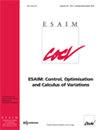pde约束形状优化的离散再优化方法
IF 1.2
3区 数学
Q4 AUTOMATION & CONTROL SYSTEMS
Esaim-Control Optimisation and Calculus of Variations
Pub Date : 2023-10-04
DOI:10.1051/cocv/2023071
引用次数: 2
摘要
考虑离散化的二维pde约束形状优化问题,其中形状用三角形网格表示。考虑到连通性,允许顶点位置的空间最近被确定为光滑流形,称为平面三角形网格流形。后者可以被赋予一个完整的黎曼度量,它允许大的网格变形而不损害网格质量;参见[14]。尽管如此,寻找最优顶点位置的离散形状优化问题通常不具有全局最优解。为了克服这种病态,我们建议在目标函数中加入网格质量惩罚项。这使得我们可以同时渲染可解决的形状优化问题,并跟踪网格质量。证明了惩罚问题的全局最优解的存在性,并建立了独立于所选黎曼度量的一阶必要最优性条件。由于黎曼度量选择存在结果的独立性,我们可以数值研究不同黎曼度量对最陡下降法的影响。我们比较了欧几里得、弹性和一种新的完整度量,结合欧几里得和测地线收缩来执行网格变形。本文章由计算机程序翻译,如有差异,请以英文原文为准。
A discretize-then-optimize approach to PDE-constrained shape optimization
We consider discretized two-dimensional PDE-constrained shape optimization problems, in which shapes are represented by triangular meshes. Given the connectivity, the space of admissible vertex positions was recently identified to be a smooth manifold, termed the manifold of planar triangular meshes. The latter can be endowed with a complete Riemannian metric, which allows large mesh deformations without jeopardizing mesh quality; see [14]. Nonetheless, the discrete shape optimization problem of finding optimal vertex positions does not, in general, possess a globally optimal solution. To overcome this ill-possedness, we propose to add a mesh quality penalization term to the objective function. This allows us to simultaneously render the shape optimization problem solvable, and keep track of the mesh quality. We prove the existence of globally optimal solutions for the penalized problem and establish first-order necessary optimality conditions independently of the chosen Riemannian metric. Because of the independence of the existence results of the choice of the Riemannian metric, we can numerically study the impact of different Riemannian metrics on the steepest descent method. We compare the Euclidean, elasticity, and a novel complete metric, combined with Euclidean and geodesic retractions to perform the mesh deformation.
求助全文
通过发布文献求助,成功后即可免费获取论文全文。
去求助
来源期刊

Esaim-Control Optimisation and Calculus of Variations
Mathematics-Computational Mathematics
自引率
7.10%
发文量
77
期刊介绍:
ESAIM: COCV strives to publish rapidly and efficiently papers and surveys in the areas of Control, Optimisation and Calculus of Variations.
Articles may be theoretical, computational, or both, and they will cover contemporary subjects with impact in forefront technology, biosciences, materials science, computer vision, continuum physics, decision sciences and other allied disciplines.
Targeted topics include:
in control: modeling, controllability, optimal control, stabilization, control design, hybrid control, robustness analysis, numerical and computational methods for control, stochastic or deterministic, continuous or discrete control systems, finite-dimensional or infinite-dimensional control systems, geometric control, quantum control, game theory;
in optimisation: mathematical programming, large scale systems, stochastic optimisation, combinatorial optimisation, shape optimisation, convex or nonsmooth optimisation, inverse problems, interior point methods, duality methods, numerical methods, convergence and complexity, global optimisation, optimisation and dynamical systems, optimal transport, machine learning, image or signal analysis;
in calculus of variations: variational methods for differential equations and Hamiltonian systems, variational inequalities; semicontinuity and convergence, existence and regularity of minimizers and critical points of functionals, relaxation; geometric problems and the use and development of geometric measure theory tools; problems involving randomness; viscosity solutions; numerical methods; homogenization, multiscale and singular perturbation problems.
 求助内容:
求助内容: 应助结果提醒方式:
应助结果提醒方式:


